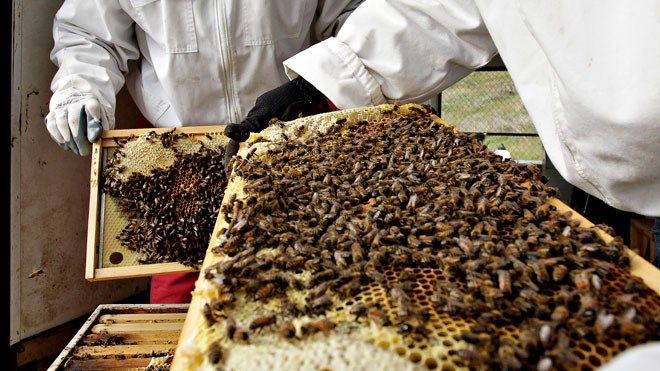Vale’s newest recruits don’t have to be told what to do, are paid a pittance and are happy to work overtime, but don’t worry. They can’t mine nickel.
Just as important, however, the 300,000 and 400,000 bees are busy maintaining and enhancing the vegetation cover on the company’s slagpile overlooking Big Nickel Mine Drive.
The bees, housed in seven hives, contribute to Vale’s regreening and biodiversity efforts by doing what comes naturally to them: pollinating and collecting nectar.
“When we do a reclamation project, we try our best to get a diverse cover of plant material so it’s more robust,” said Glen Watson, Vale superintendent for decommissioning and reclamation. In the past, he explained, “we’d choose species that are known to thrive in our climate and end up with a monoculture.”
The first five hives were set up in a utility trailer on the 120-acre site in May 2013.
A small amount of honey has been collected from the hives, but like all bees in Ontario and across North America, Vale’s bees are battling climate change and succumbing to insecticides.
According to retired Vale employee and beekeeper Wayne Tonelli, who has been hired to care for the bees, Ontario beekeepers lost 58 per cent of their bees this year due to a combination of insecticides and a long, cold winter.
With this year’s cool, rainy summer limiting nectar collection, Tonelli has had to supplement the bees’ supply of honey with 120 litres of sugar syrup to help them make it through this coming winter.
Insecticides, however, are the biggest threat to the bees and, by extension, to our own food supply as “bees pollinate every third or fourth mouthful that we eat,” warned Tonelli.
To counter the threat, the Ontario Beekeepers Association has launched a class action lawsuit against companies manufacturing and marketing neonichinoids, a class of insecticides primarily responsible for bee mortality.
Norm Tollinsky is the editor of the Sudbury Mining Solutions Journal.
Join Sudbury.com+
- Messages
- Post a Listing
- Your Listings
- Your Profile
- Your Subscriptions
- Your Likes
- Your Business
- Support Local News
- Payment History
Sudbury.com+ members
Already a +member?
Not a +member?
Sign up for a Sudbury.com+ account for instant access to upcoming contests, local offers, auctions and so much more.
